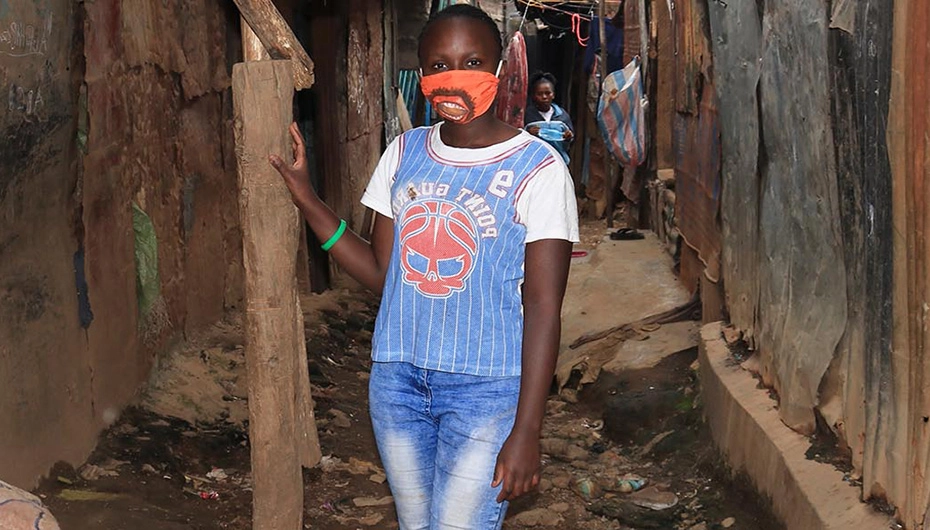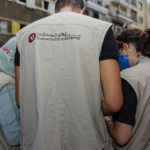Media Centre - Media release - 27 August 2020
Violence against girls in Africa soars as COVID-19 lockdowns continue and hunger worsens

Media contact: Jane Gardner, 0438 130 905/ jane.gardner@plan.org.au Photographs and case studies, as well as the full report are available for media use here. Interviews with experts in the field can be arranged via our Africa-region communications team.
Rates of violence against girls and women in Africa are soaring as COVID-19 intensifies and lockdowns continue, according to new research from the charity for girls’ equality Plan International and the African Child Policy Forum.
The Under Siege: Impact of COVID-19 on Girls in Africa report involved eye-witness accounts from girls across 55 African Union states, as well as interviews with politicians and aid workers. It shows a sharp increase in calls for help and first-hand accounts of violence and issues of hunger directly associated with COVID-19.
Plan International Australia has launched an urgent appeal to respond to the profound secondary impacts of the virus, including profound hunger, sexual assault and violence against children and girls (see: https://www.plan.org.au/appeal/covid-19-appeal/).
More than 120 million girls in Africa are currently out of school due to lockdowns across the continent, and many fear they may never be able to go back.
“For hundreds of thousands of girls, school is the only safe space they know, and the only source of a decent meal,” Plan International Australia CEO Susanne Legena said.
“These girls are reporting heightened anxiety under quarantine and confinement and many are reporting this situation has led to perpetrators’ of violence abusing their position, trust and authority.
“Young women and girls have told our researchers that they are often fearful to go to a hospital to seek healthcare or sexual and reproductive services. Even in emergency situations, they do so at the real risk of assault or arbitrary detention for curfew violations.”
Janet, 14, from Liberia, says: “My fear with this virus [COVID-19] is that women will really suffer. We will suffer over food. Men will abuse us. Because if I don’t have food and a boy has food, if I ask him for help, he will ask me for sex before he gives me some. This is the suffering I am talking about.”
The pandemic has also thrown millions of families – up to 29 million – further into extreme poverty and affected access to social services. Health systems have diverted attention from immunisation programs, sexual and reproductive services and high prevalence conditions such as malaria, HIV/AIDS and TB.
Halima, 16, from Niger, says: “I pray the government finds a solution to this disease as soon as possible, so girls like me can go back to school. My dream of becoming a doctor should not be broken, please.”
Girls with disabilities, girl domestic workers, girls living or working on the street and in urban slums, girls in institutional care, and in detention centres, displacement and refugee camps and stateless girls have especially been more severely affected.
“The stark reality is that in most African countries, many girls and children unfortunately live on the street. Now with hotels and shops closed and streets empty, these girls, who normally rely on food handouts from hotels and restaurants and on street trade, are now struggling for survival.”
About 56% of the urban population in sub-Saharan Africa is concentrated in overcrowded and poorly serviced slum dwellings and only 34% of the households have access to basic hand washing facilities, raising serious concerns in the context of COVID-19.
KEY FINDINGS OF THE UNDER SIEGE REPORT
- Child Helpline Uganda received a total of 718 calls related to girls from 10 April to 14 June 2020. About 73% of these calls were related to abuse against girls. Mothers account for the largest percentage of people who reported the abuse followed by non-related adults, including neighbours.
- The Kenya National Council on Administration of Justice, reported a significant spike in sexual offences in many parts of the country. Sexual offences such as rape and defilement have constituted more than 35% of all reported cases
- The Gender-Based Violence Command Centre in South Africa recorded a sharp increase in cases of up to 10,660 reported through phone calls during the lockdown from 27 March to 16 April and about 1503 calls through unstructured supplementary services data and 616 through SMS. In one single day, on 16 April, the Centre received reports of 674 cases.
- In Ethiopia, data from few hospitals in Addis Ababa, showed that, between mid-March and mid-May 2020, within the space of less than two months, more than 100 girls have been raped, some of them by close family members.
- In Zimbabwe, there have been reports of an increase in cases of young girls forced into transactional sex in return for cash, food, or even sanitary products.
- In Somalia, there has been a 50% increase in calls to helplines/ hotlines across the country.
- In Niger, 499 gender-based violence cases were reported in Niamey between January and April 2020 (86 in January to 212 in April), which points out to a worrying increase as a result of COVID-19. Also of concern is the increase in cases of forced marriage.
- Adopting a rights and gender-responsive approach to COVID-19 control measures.
- Recognising girls’ voice and agency by consulting and taking into account girls and young women’s views in the response and recovery to COVID-19
- Alleviating poverty and providing economic support
- Ensuring access to basic and sexual and reproductive health services
- Making gender-disaggregated data available
- Strengthening national and regional child protection networks and systems to ensure perpetrators of abuse are swiftly brought to book
Plan International Australia is supporting the ongoing global response to COVID-19 and ensuring that girls are not forgotten during this crisis. Visit https://www.plan.org.au/appeal/covid-19-appeal/ to learn more about our work during this pandemic and how your financial contribution could help.
Please visit the launch website at https://girls.africanchildforum.org for more information on the report. To request an interview with a spokesperson in Africa, please contact:
Regional Communications and Media Specialist
Email: evelyn.wambui@plan-international.org
Mobile phone: +254 793269706
Put simply, we’re the charity for girls’ equality. We tackle the root causes of poverty, support communities through crisis, campaign for gender equality, and help governments do what’s right for children and particularly for girls. We believe a better world is possible. An equal world; a world where all children can live happy and healthy lives, and where girls can take their rightful place as equals.
Media contacts


